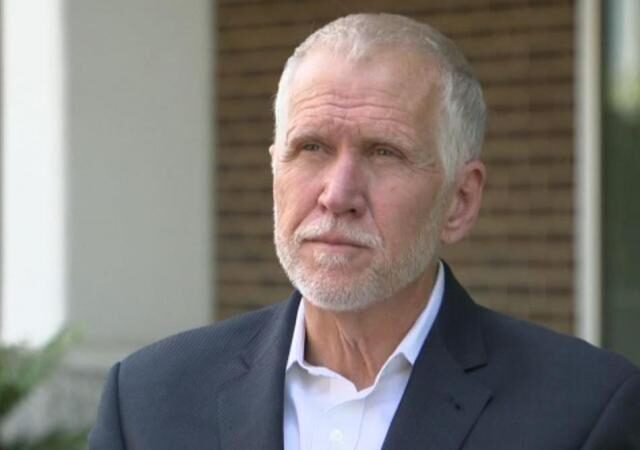
No state has qualified for the federal funding Congress passed last year to help implement red-flag gun laws, according to Sen. Thom Tillis, who was instrumental in the legislation.
“And I hope that states that consider red-flag laws understand up front what they have to put in place to satisfy me,” Tillis said.
Tillis also told WRAL News:
- He has no immediate plans to endorse in the 2024 North Carolina governor’s race, and that he won’t be a candidate himself.
- He sees a recession coming based on data he reviews as a member of key U.S. Senate committees. In a recent letter on debt ceiling negotiations, Tillis said the current U.S. economy is in free fall.
- Fort Bragg needs hundreds of millions of dollars to address barracks improvements and other issues on base
- He expects Congress to pass new subsidies to support early child care, an industry that will otherwise lose pandemic era federal subsidies later this year. He didn’t give a timetable or amount.
Here’s a transcript of that interview, edited for brevity and clarity.
WRAL: Are you going to endorse a candidate in the North Carolina Republican gubernatorial primary?
TILLIS: I’m waiting. Right now I’m looking at the candidates.
WRAL: Any particular thoughts to share now?
TILLIS: I think now’s the time for fiscal restraint, getting our house in order. We need candidates that are speaking optimistically about this country, and I’m going to be looking at somebody that can package a really good, solid conservative message and make you feel good about it.
TILLIS: I think we’ve got a primary to play out. And then the people of North Carolina, like me, one voter, can decide.
WRAL: On the debt ceiling — it’s not about future spending, future tax cuts. It’s about paying for what we’ve already done. Why does Congress not authorize the debt ceiling increase with the spending and tax policy? Why are we waiting and flirting with default?
TILLIS: We’re coming dangerously close to going into default for the first time in our nation’s history. The adults need to get in the room and seek a compromise. But for [President] Biden, who voted against a debt ceiling increase when he was in the Senate, he needs to remember that when you have divided government, you need to compromise. And going in with a posture of clean [continuing resolution] or nothing is not good faith and bad leadership.
WRAL: Structurally, though, to separate the debt ceiling from the spending, how do you convince people that’s not foolish national policy?
TILLIS: They’re intrinsically linked. So then you have whatever timeframe we come up with for increasing the debt ceiling. If we don’t have some restraint on spending, we know it’s going to be the same movie a month or a year from now. And I think that we need to go and tell the American people we’re getting our debt under control. We’re on a spinning path now for $40 trillion [in national debt]. We’ve got to be serious about the future of our children. We created this bill, we created this debt, this generation should solve the debt problem.
WRAL: One of the things Democrats have seized on are some veteran health care funding cuts.
TILLIS: Typical cheap shot. The same people that are talking about dramatic cuts to veterans, which they know is structurally impossible in the U.S. Congress, regardless of who’s in power, are the same ones saying that children are going to be denied food. What part of “able-bodied adult without children” did they not understand in terms of that policy? So if they really want to get to a compromise, why don’t you just speak the truth about provisions that you don’t like?
WRAL: You were at Fort Bragg the other day. Are you satisfied with the progress and the scope of the barracks projects there?
TILLIS: No, not at all. We are woefully behind. I toured a couple of barracks that are being renovated now. We’re trying to put lipstick on a pig. I mean, there are some buildings down there that need to be torn down. We’re at risk, again, of not hitting our in-strength goals for recruiting. And a part of recruiting are the living conditions that these young recruits are going to live in. It’s the childcare centers that their children may go to. And we’ve got hundreds of millions of dollars that need to be focused on Fort Bragg. We’re also in a humidity-prone area between Fort Bragg and Camp Lejeune. A lot of what they’re dealing with there are rotted floor joists. I went through a house that reminded me of the Lost Dutchman thing that they would have at fairs in the past. You felt like you were walking on a waterbed. That’s all moisture and damage that’s occurred over time. And some of these houses are 60, 70, 80 years old.
Your browser doesn’t support HTML5 video.
TILLIS: I think so. You talk about single mothers, single fathers, people that want to work, people that want to go to school and maybe get qualified for a higher paying job, they have to have an option. And we simply don’t have enough. There’s a waiting list on Fort Bragg alone of hundreds of kids to get into these programs — which are some of the best in the country, incidentally. They’re doing a good job for the children that they can serve. But we’ve got a chronic backlog nationally that we need to address.
WRAL: Returning to the debt ceiling, you and a number of your colleagues sent a letter — one of the things you said is that the economy is in a free fall. Do you really believe that the economy is in a free fall?
WRAL: If you’ve been worried about a recession for two and a half years, at some point, isn’t it time for a little bit of optimism, lest you talk yourself into a recession?
TILLIS: The problem here is that public perception causes a lot of it, but I sit on the Banking Committee, and I sit on the Finance Committee. So I’m watching things at a very granular level. Sometimes perceptions have the heaviest weight in going into a recession, but we’ve got a lot of fundamentals coming together at the worst possible time.
WRAL: On immigration. People, I don’t know that they understand Title 42 versus Title 8, what’s happening at the border and what needs to be done. You’ve said many times we need some comprehensive changes. Do you have a sense of what those comprehensive changes — after all these years we’ve discussed them — would look like?
WRAL: You know, it’s sad, you said ‘the shooter in Texas’ and my first thought was, which one?
WRAL: Is that the bill that had some incentives for states to pass red-flag laws?
TILLIS: It had incentives for states to pass red-flag laws that had due process and restitution, which is why I don’t think any state right now that has red flag laws are qualified for the funding. We’re looking, I’m looking at red states like Indiana, Florida. We’re looking at the Tennessee bill now. Indiana and Florida wouldn’t qualify for it, because it’s a very rigorous process. And I hope that states that consider red-flag laws understand up front what they have to put in place to satisfy me. My office was primarily responsible for the due-process provisions. Most of them are going to find out they’re going to make an application and they’re going to be deemed as not adhering to due process within the law.
TILLIS: No, not at all. I made it very clear that we would not pass a national red-flag law, and that I would not support a bill that didn’t make sure that the gun owner was guaranteed due process. But I thought this was something that the state should have control over, and that’s how we implemented it.
WRAL: Do you think more gun laws are needed?







